| Srl | Item |
| 1 |
ID:
114656
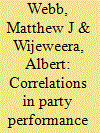

|
|
|
|
|
| Publication |
2012.
|
| Summary/Abstract |
Using a panel data estimation technique, this article examines correlations in party performance in India for political parties that contested legislative assembly and federal parliamentary elections held within the following eighteen months during the period between 1980 and 2009. The results are analysed according to a range of variables, including type of party and voter turnout. The study's finding that, across party types, there is a strong and statistically significant correlation in party performance between the two elections provides empirical corroboration of prior studies that have suggested the existence of enduring linkages between politics at the state and federal levels. It also offers some validation for the popular media's and others' preoccupations with the outcome of legislative assembly elections as indicators of subsequent parliamentary polls.
|
|
|
|
|
|
|
|
|
|
|
|
|
|
|
|
| 2 |
ID:
116056


|
|
|
|
|
| Publication |
2012.
|
| Summary/Abstract |
This article examines the case for Jammu and Kashmir's independence from India as a matter of remedial justice within the context of a moral right to secede premised upon the circumstances of the state's 1947 inclusion within the Indian union. Principles of remedial justice are defended as a suitable basis for adjudicating rival claims to sovereignty and negotiating secessionist disputes. The case for Kashmir's secession as a matter of remedial justice is then investigated with reference to the claims that India attempted to seize the former princely state by force and reneged on the promise of a plebiscite to ratify its sovereignty. This article argues that, while a contractual understanding of these claims might yield a coherent explication of a right to secede, this would not include a right to independent statehood and should be rejected because of the corollary that Dogra rule was morally legitimate. By contrast, the state's right to secede might be justified by reference to the claim that the events of accession violated its inhabitants' rights to popular sovereignty and self-determination. However, while offering a more plausible account of a right of secession, such a justification would not be a specifically remedial one and would fail to include many of the benefits of a remedial right. Consequently, we need to look beyond the historical events surrounding the state's accession as the basis for reconciling competing claims regarding Kashmir's rightful political status within a framework of remedial justice.
|
|
|
|
|
|
|
|
|
|
|
|
|
|
|
|
| 3 |
ID:
135176
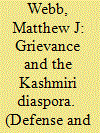

|
|
|
|
|
| Summary/Abstract |
Grievance theories that emphasize injustice as the primary cause of secessionist violence offer valuable insights into the motivations of sponsors and participants. However, they face a difficulty in explaining the participation and support of geographically dispersed populations of co-ethnics (diaspora) that is not shared by rival theories that instead emphasize self-interest. This article uses the Kashmiri diaspora in Britain to examine how appeal to nationalist factors of shared identity, mutual sympathy and common understandings might allow grievance theories to effectively explain diaspora support. It concludes that, while a hybrid grievance-nationalist model might offer a more accurate and nuanced explanatory account of secessionist violence, it does so at the cost of conceptual clarity. Finally, the article addresses the implications for states and strategies to reduce the mobilization of diaspora in order to deny secessionists’ valuable assistance.
|
|
|
|
|
|
|
|
|
|
|
|
|
|
|
|
| 4 |
ID:
137936
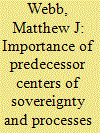

|
|
|
|
|
| Summary/Abstract |
A range of theories have sought to explain and predict secession with varying degrees of success. Arguing that a disproportionate focus upon the seceding group as the unit of analysis has frustrated the development of a comprehensive theoretical framework that is universally valid, this article highlights the role of predecessor institutions of governance and the failure of states to successfully incorporate these as an important, but neglected, causal factor in the study of secession. The inclusion of pre-state institutions of governance and processes of state formation not only results in a more complete, and therefore accurate, explanatory account of secession, but also explains why some regions have been more prone to secession than others.
|
|
|
|
|
|
|
|
|
|
|
|
|
|
|
|
| 5 |
ID:
119268
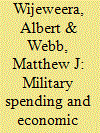

|
|
|
|
|
| Publication |
2013.
|
| Summary/Abstract |
We review some critical comments upon our earlier paper in this journal and respond to these. We also critically evaluate a proposed alternative methodology giving reasons why our own provides a more robust approach for examining the nexus between military spending and economic growth in South Asia.
|
|
|
|
|
|
|
|
|
|
|
|
|
|
|
|
| 6 |
ID:
107554
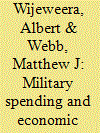

|
|
|
|
|
| Publication |
2011.
|
| Summary/Abstract |
Despite the large number and variety of studies addressing the relationship between military spending and economic growth, a consensus regarding the exact nature of any relationship between the two has proven elusive. This study uses a panel co-integration approach to examine the relationship between military spending and economic growth in the five South Asian countries of India, Pakistan, Nepal, Sri Lanka and Bangladesh over the period of 1988-2007. It finds that a 1% increase in military spending increases real GDP by only 0.04%, suggesting that the substantial amount of public expenditure that is currently directed towards military purposes in these countries has a negligible impact upon economic growth.
|
|
|
|
|
|
|
|
|
|
|
|
|
|
|
|
| 7 |
ID:
092941
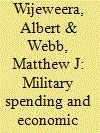

|
|
|
|
|
| Publication |
2009.
|
| Summary/Abstract |
In this paper, we employ a VAR analysis to examine the nexus between military spending and economic growth in Sri Lanka which, due to the civil war there, has witnessed a significant increase in military spending over the last three decades while also recording healthy economic growth. The study finds that, compared with non-military spending, military spending exerts only a minimal positive impact on real GDP. Over a 10-year period, a 1% increase in non-military spending increases GDP by 1.6%. In contrast, military spending only increases GDP by 0.05%, suggesting that the economic benefits for Sri Lanka from a sustained peace may be considerable.
|
|
|
|
|
|
|
|
|
|
|
|
|
|
|
|
| 8 |
ID:
061609
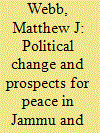

|
|
|
| 9 |
ID:
140102
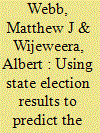

|
|
|
|
|
| Summary/Abstract |
Using a multivariate regression analysis, this article examines linkages in major parties’ performance that contested legislative assembly and Parliamentary elections in India held within the subsequent 18 months over the period 1980–2009. The results are analysed according to a range of variables including party identity, incumbency and geographical region. The study’s finding that for a number of parties there is a strong and statistically significant linkage corroborates earlier studies and suggests that the allocation of resources by major parties to Legislative Assembly campaigns may be an effective strategy for maximising the party’s share of votes in subsequent Parliamentary elections.
|
|
|
|
|
|
|
|
|
|
|
|
|
|
|
|
| 10 |
ID:
112393
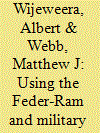

|
|
|
|
|
| Publication |
2012.
|
| Summary/Abstract |
This study uses the Feder-Ram model in conjunction with the military Keynesian model to examine the nexus between defence spending and economic growth in Sri Lanka. We find that the Keynesian aggregate demand model is better suited to analyse the link than the Feder-Ram model for the case of Sri Lanka. Based upon our results we expect a higher economic growth rate in Sri Lanka if more public resources are diverted from the defence to civilian sectors of the economy, now that the war between the government and separatist guerrillas has come to an end. However, recent post war events cast doubt upon whether a diversion of sources from military to non-military spending will actually occur. We conclude that the sanguine predictions of our economic analysis are entirely dependent upon the political decisions of the Sri Lankan government for their realization.
|
|
|
|
|
|
|
|
|
|
|
|
|
|
|
|